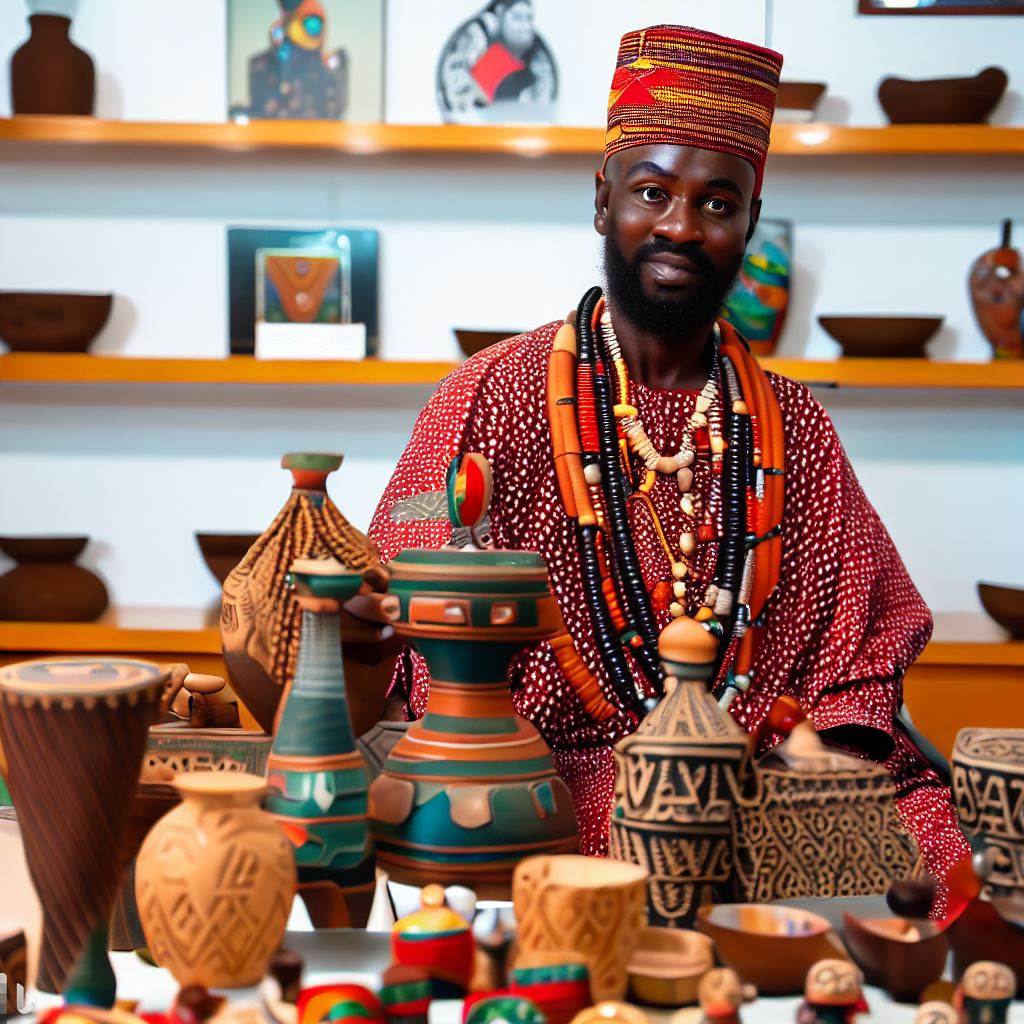Success Stories: Nigeria’s Notable Craftsmen
Last Updated on August 1, 2023
Introduction
Success is a subjective concept that differs from person to person. It is a reflection of an individual’s achievements and accomplishments in life.
Nigeria’s craftsmanship industry has made tremendous contributions to the economy, creating job opportunities for thousands of people.
The industry is vast, ranging from leather works, pottery, woodcarving, and bead making, among others. The craftsmen and women in Nigeria have surpassed expectations, displaying unique skills and creating unique products that are sought after locally and internationally.
It is inspiring to know that despite the challenges they face, these craftsmen have been able to carve a niche for themselves and achieve success on their terms. This section will highlight some notable craftsmen and their success stories in Nigeria.
Success stories of Nigerian craftsmen
Craftsmanship has been an integral part of the Nigerian culture for centuries, and its craftsmen have consistently showcased their abilities, creativity, and ingenuity.
Here are some of the notable Nigerian craftsmen and their success stories:
Nike Davies-Okundaye
Nike Davies-Okundaye is a renowned textile artist, painter, and designer, who has made a significant impact in the Nigerian art and craft industry and beyond. She is the founder and director of the Nike Art Gallery, with branches in Lagos, Abuja, and Osogbo.
Nike is also the first African woman to have a solo exhibition at the Centre for African Culture in Brussels, Belgium. She has held solo exhibitions in the United States, Italy, Germany, and England.
Her works have been featured in numerous local and international publications, and she has won several awards and recognitions for her contributions to the arts.
Adebayo Dipeolu
Adebayo Dipeolu is a master wooden sculptor, whose works are not only aesthetically pleasing but also tell stories of African culture and tradition.
He is the founder and director of the Black Heritage Gallery, which aims to promote African art and culture. Adebayo’s works have been exhibited in several African countries and the United States.
He has won several awards, including the National Merit Award, and his works can be found in private and public collections.
Yusuf Grillo
Yusuf Grillo is a painter, printmaker, and art educator, who has made a significant contribution to the Nigerian art scene. He was the head of the Art Department at the renowned Yaba College of Technology, Lagos, from 1972 to 1980, and has also served in various capacities at the National Gallery of Art.
Yusuf’s works have been exhibited in several countries, including the United States, England, and Germany. He has won numerous awards and recognitions for his contributions to the arts, including the Officer of the Order of the Niger (OON) award.
Lamidi Fakeye
Lamidi Fakeye was a master woodcarver from Oyo State, who was regarded as one of the greatest sculptors in Nigeria. He was the son of the renowned woodcarver, Olowe of Ise, and learned the art of woodcarving from his father.
Lamidi’s works can be found in various private and public collections, including the National Museum in Lagos. He won numerous awards and recognitions for his contributions to the arts, including the Member of the Order of the Niger (MON) award.
Bruce Onobrakpeya
Bruce Onobrakpeya is a printmaker, painter, and sculptor, whose works explore Nigerian traditional culture and mythology. He is regarded as one of the pioneers of contemporary Nigerian art and has exhibited his works in several countries, including the United States, England, and Japan.
Bruce has won several awards and recognitions for his contributions to the arts, including the Officer of the Order of the Federal Republic (OFR) award.
In summary, these Nigerians have demonstrated that with dedication, talent, and hard work, it is possible to excel in any field.
Their significant contributions to the Nigerian art and craft industry have not gone unnoticed, and they serve as a source of inspiration to the upcoming generation of craftsmen in Nigeria.
Read: Eco-Tourism in Nigeria: Potential and Job Opportunities
Factors Contributing to the Success of Nigerian Craftsmen
Craftsmanship is an industry that demands a lot of creativity, innovation, resilience, mentorship, and training. Below are some significant factors responsible for the success of Nigerian craftsmen in the industry.
Hard Work
Success in the craftsmanship industry is attributed to hard work, which involves dedication and commitment to your craft. Craftsmen in Nigeria spend long hours perfecting their skills and creating masterpieces that reflect their creativity and ability.
Successful craftsmen understand the importance of hard work and often operate under a “best effort” mentality.
Creativity
Creativity is an essential ingredient in the craftsmanship industry, and Nigerian craftsmen have it in abundance. They are skilled in designing and creating eye-catching pieces that showcase their artistic abilities.
Creativity is the driving force behind the uniqueness and beauty of their products, which sets them apart from others in the industry.
Innovation
Innovation is a significant factor that contributes to the success of Nigerian craftsmen. With the ever-evolving market, craftsmen in Nigeria have to keep up with new trends and products, and that means they have to be innovative.
Constantly seeking to improve and stay ahead, these craftsmen do everything possible to be a step ahead of their competition.
Resilience
Resilience is the ability to withstand and bounce back from difficult situations like economic downturns and market trends.
Nigerian craftsmen exhibit tenacity in the business, persevering through tough times to stay relevant in the industry.
They understand that challenges come with the trade and see them as opportunities to grow and improve.
Mentorship
Mentorship is a vital component of the Nigerian craftsmanship industry. Whether it’s training from a family member, a skilled craftsman, or a trained professional, craftsmen who have had the benefit of mentorship typically perform better.
They learn best practices and the dos and don’ts of the industry, which sets them up for success in the long run.
Training
Training is a critical part of Nigerian craftsmanship. Many craftsmen learned their trade through apprenticeships or formal vocational training.
These training programs offer critical instruction on the essentials of the trade, which can improve performance, product quality, and financial gains.
Investing in training helps craftsmen position themselves for future success in the industry.
Anyone can be successful in the craftsmanship industry, regardless of background, as long as they work hard, stay creative and innovative, remain resilient, find quality mentorship, and invest in quality training.
These factors are vital to success in the industry, and Nigerian craftsmen are a prime example of how they can help young professionals rise to the top.
With these factors in place, any aspiring craftsman can build a lasting and successful career in Nigeria.
Read: The Intricacies of Running a Nigerian Taxi Service

Challenges faced by Nigerian craftsmen
Craftsmanship is an essential part of Nigeria’s cultural identity, which has helped the industry flourish over the years. However, Nigerian craftsmen face various challenges that lead to low turnover and profitability.
In this section, we will analyze some of the challenges and hurdles faced by Nigerian craftsmen and how they have used innovative tactics like partnership and collaboration to overcome these obstacles.
Poor Infrastructure
One of the significant challenges faced by Nigerian craftsmen is poor infrastructure. The inadequate transportation network makes it difficult to transport raw materials and finished products.
This leads to delays in delivery, which affects the turnover of the craftsmen.
Lack of Government Support
Another challenge is the lack of support from the government. There are no favorable policy frameworks, tax incentives, or subsidies that can help the craftsmen to grow.
The government’s inability to provide a stable power supply and a conducive environment affects the profitability of the craftsmen.
Lack of Funding
Craftsmanship requires capital, and the lack of access to finance is another challenge that Nigerian craftsmen face.
Many craftsmen have innovative ideas but are unable to implement them due to inadequate funding. This limits their ability to grow and expand their businesses.
Inferior Quality Raw Materials
The quality of raw materials used is another significant challenge faced by Nigerian craftsmen. The quality of raw materials sourced locally is not up to the international standard, which limits the craftsmen’s ability to produce high-quality products.
They have to spend more money sourcing quality raw materials, which affects their profitability.
Stiff Competition
The crafts industry in Nigeria is highly competitive, with many players vying for the limited market share. The competition forces craftsmen to reduce their prices to attract customers, which affects their profit margins.
Partnership and Collaboration
Despite these challenges, Nigerian craftsmen have used innovative tactics to overcome these obstacles, such as partnership and collaboration.
By partnering with other craftsmen, they can pool resources and expertise to overcome the challenges they face.
Collaboration with international partners can also provide access to better quality raw materials and finance.
Overcoming the Challenges
Nigerian craftsmen have used various strategies to overcome these challenges. Some craftsmen have adopted an online presence and leverage social media to reach a wider audience.
They have also invested in their skills and acquired new techniques to meet the changing demands of the market.
Nigerian craftsmen face various challenges that affect their turnover and profitability. The lack of government support, poor infrastructure, and inadequate funding are some of the significant issues they face.
However, the craftsmen have used innovative strategies like partnership and collaboration to overcome these challenges and achieve success.
The use of technology and investment in skills development can also help them overcome these obstacles and achieve their full potential.
Read: Emerging Trade Skills Trending in Nigeria Today
Impact of Success Stories of Nigerian Craftsmen
Nigeria has produced notable craftsmen whose success stories have positively impacted the wider Nigerian society.
These craftsmen have not only demonstrated their skills but also created jobs, increased trade and foreign investments, and boosted the Nigerian economy’s international image.
Job Creation
The success of Nigerian craftsmen has resulted in the creation of many job opportunities in different sectors of the economy.
One such craftsman is Nike Davies-Okundaye, who founded Nike Art Gallery in Lagos in 1983. Today, the gallery employs over 150 people who work as artists, tour guides, and security personnel.
In the same vein, Sadiq Usman, a leather craftsman from Sokoto State, has created jobs for many in his community.
He started by making leather goods for his family and friends, but as demand grew, he established a workshop where he now employs over 20 people.
Increased Foreign Investments
The success stories of Notable Nigerian Craftsmen have also attracted foreign investors and international organizations to Nigeria.
Most recently, the British Council partnered with some Nigerian craftsmen to create a program that aims to promote and sustain traditional crafts in Nigeria.
This collaboration has brought in significant foreign investments into the country.
Also, the success of Nigerian craftsmen has increased demand for Nigerian-made crafts in international markets, leading to increased exports.
For instance, Yusuf Lawal, a woodcarver from Oyo State, has sold his carvings in many international markets, including the United States and Canada, resulting in increased foreign exchange earnings for Nigeria.
Positive Impact on the Nigerian Economy
The success stories of Notable Nigerian Craftsmen have significantly impacted the Nigerian economy. These craftsmen have contributed to the country’s GDP by exporting their exceptional works of art, which have brought in foreign exchange earnings.
Nigeria’s international image has also received a positive boost from these success stories. The country has become a hub for creative arts and crafts, attracting international attention and visitors seeking Nigerian art and culture experiences.
This has led to the growth of the creative arts industry and the country’s economy at large.
The success stories of Notable Nigerian Craftsmen have brought many positive changes to the Nigerian society and economy. Their contributions cannot be overlooked, from the jobs created to the increased investments and foreign exchange earnings.
Their success stories Notable Nigerian Craftsmen have placed Nigeria on the world map as a hub for creative arts and crafts, leading to a positive impact on the economy and the country’s international image.
Read: Exploring the Rich History of Craftsmanship in Nigeria
Conclusion
This blog post highlights notable Nigerian craftsmen, their success stories, struggles, and achievements, serving as role models.
Celebrating craftsmen’s success motivates and promotes the industry’s growth, Nigeria’s positive image, and attracts clients and investors.
We encourage the Nigerian government, private organizations, and NGOs to create platforms for celebrating and sharing success stories of Nigerian craftsmen. The media should showcase these craftsmen worldwide, inspiring and motivating young and upcoming craftsmen globally.


